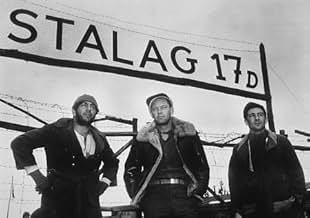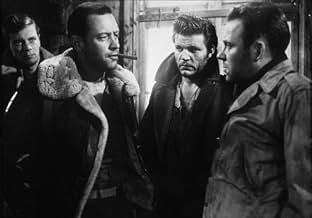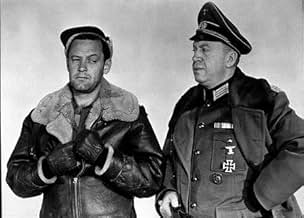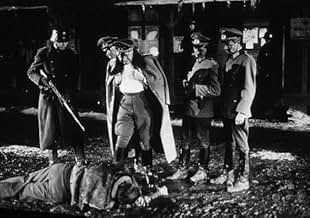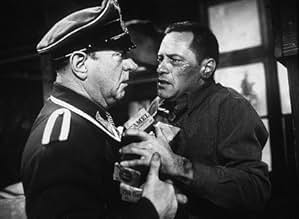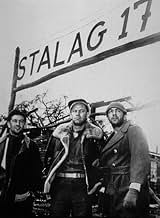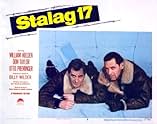Stalag 17
IMDb RATING
7.9/10
60K
YOUR RATING
After two Americans are killed while escaping from a German P.O.W. camp in World War II, the barracks black marketeer, J.J. Sefton, is suspected of being an informer.After two Americans are killed while escaping from a German P.O.W. camp in World War II, the barracks black marketeer, J.J. Sefton, is suspected of being an informer.After two Americans are killed while escaping from a German P.O.W. camp in World War II, the barracks black marketeer, J.J. Sefton, is suspected of being an informer.
- Won 1 Oscar
- 2 wins & 8 nominations total
Gil Stratton
- Sgt. Clarence Harvey 'Cookie' Cook
- (as Gil Stratton Jr.)
Featured reviews
Director Billy Wilder was certainly no stranger to the horrors of World War Two. He was born in Austria-Hungary {now Poland} in 1906, but moved to Berlin to begin a career in movies. However, following the rise of Adolf Hitler, Wilder being Jewish fled for Paris and then the United States. His mother, grandmother and stepfather died at the Auschwitz concentration camp. As such, I think it'd be safe to presume that Wilder housed a considerable hatred towards Nazis, which makes his POW-picture, 'Stalag 17 (1953),' all the more remarkable. Whereas the film might have developed into a bleak, depressing drama, the screenplay by Wilder and Edwin Blum {adapted from a play by Donald Bevan and Edmund Trzcinski} effortlessly blends drama and comedy, clearing the path for other similarly-themed war-time films {David Lean's 'The Bridge on the River Kwai (1957)' and John Sturges' 'The Great Escape (1963)'} and even TV series {'Hogan's Heroes (1965-1971)' clearly used Wilder's film as a template including an identical Sgt. Schulz despite a failed court case in which producers sued for infringement}.
The year is 1944, in the week before Christmas. Stalag 17, a Nazi prisoner-of-war camp, is situated somewhere along the Danube River, and hundreds of captured Allied sergeants have been imprisoned there. The Americans of Barrack 4 endure a dull, deprived lifestyle, with each day consisting of unwholesome meals, tedious labour and uncomfortable living conditions. Displaying that typical American cleverness and resourcefulness, many of the prisoners have banded together to ensure themselves a few added luxuries such a makeshift radio to listen to the latest war news and to build an effective escape tunnel beneath the camp. However, it soon becomes apparent that there is a Nazi spy within their midst. After two escaping prisoners are immediately shot down, and their escape passage is inexplicably discovered, the men turn their suspicions towards J.J. Sefton (William Holden), a selfish and arrogant prisoner with a dog-eat-dog mentality that sees him openly bribing the German guards for luxuries. An unsympathetic character, one who nonetheless exhibits a certain streak of integrity, Sefton decides to uncover the true traitor of Barrack 4.
Though he was reluctant to play such an unlikable character, Holden won the Best Actor Oscar for his powerful performance {via the second-shortest acceptance speech in Academy Awards history a simple "thank you"}. The other actors in the film also create distinct and likable personalities, and I particularly enjoyed the big, oafish Animal (Robert Strauss) and Shapiro (Harvey Lembeck). Goodness knows what compelled the writers to make Sgt. Schulz (Sig Ruman), a loathsome tyrant in any other film, a jolly and hearty buffoon, but it works absolutely perfectly, his character's incompetence best highlighted in the sequence where he is distracted into playing volleyball, and enjoys the game so much that he hands his loaded weapon to the nearest POW. As Sefton attempts to uncover which fellow prisoner is leaving secret messages for their Nazis captors, Wilder intersperses the drama with an episodic flow of comedic situations, placing particularly emphasis on the means by which prisoners will alleviate their desire for the opposite sex. A hilarious sequence sees the drunken Animal mistaking his dressed-up bunk-mate for the cinema beauty Betty Grable, of whom he has an undying obsession.
The year is 1944, in the week before Christmas. Stalag 17, a Nazi prisoner-of-war camp, is situated somewhere along the Danube River, and hundreds of captured Allied sergeants have been imprisoned there. The Americans of Barrack 4 endure a dull, deprived lifestyle, with each day consisting of unwholesome meals, tedious labour and uncomfortable living conditions. Displaying that typical American cleverness and resourcefulness, many of the prisoners have banded together to ensure themselves a few added luxuries such a makeshift radio to listen to the latest war news and to build an effective escape tunnel beneath the camp. However, it soon becomes apparent that there is a Nazi spy within their midst. After two escaping prisoners are immediately shot down, and their escape passage is inexplicably discovered, the men turn their suspicions towards J.J. Sefton (William Holden), a selfish and arrogant prisoner with a dog-eat-dog mentality that sees him openly bribing the German guards for luxuries. An unsympathetic character, one who nonetheless exhibits a certain streak of integrity, Sefton decides to uncover the true traitor of Barrack 4.
Though he was reluctant to play such an unlikable character, Holden won the Best Actor Oscar for his powerful performance {via the second-shortest acceptance speech in Academy Awards history a simple "thank you"}. The other actors in the film also create distinct and likable personalities, and I particularly enjoyed the big, oafish Animal (Robert Strauss) and Shapiro (Harvey Lembeck). Goodness knows what compelled the writers to make Sgt. Schulz (Sig Ruman), a loathsome tyrant in any other film, a jolly and hearty buffoon, but it works absolutely perfectly, his character's incompetence best highlighted in the sequence where he is distracted into playing volleyball, and enjoys the game so much that he hands his loaded weapon to the nearest POW. As Sefton attempts to uncover which fellow prisoner is leaving secret messages for their Nazis captors, Wilder intersperses the drama with an episodic flow of comedic situations, placing particularly emphasis on the means by which prisoners will alleviate their desire for the opposite sex. A hilarious sequence sees the drunken Animal mistaking his dressed-up bunk-mate for the cinema beauty Betty Grable, of whom he has an undying obsession.
This is one of Billy Wilder's best films and still stands up very well today. Unlike the concentration camps of the Holocaust, prison camps for Allied prisoners were actually not all that bad in comparison (except for how the Russian prisoners were treated--they were often just shot). So, the prisoners enjoyed a little more freedom and were constantly trying to deal with the incredible boredom of being locked up with very little to do. As a result, films about these camps (such as this one and THE GREAT ESCAPE) are few and far between--they would just be too dull to merit a movie. However, in the case of this film, the monotony is disrupted because there apparently is a snitch within the prisoners' ranks--some rat is tipping off the Commandant (director Otto Preminger--in one of his few acting roles) about escape attempts, major rule infractions and who the actual perpetrator of a major act of sabotage was.
Naturally, prisoners begin to think that William Holden is the snitch. After all, he is living incredibly well compared to all the other Allied prisoners in the camp due to all his money-making schemes and black market activities. In addition, he is so cynical and apparently unpatriotic that he has no desire to escape--he's more than willing to sit tight until the war is over since he is safe and happy! In this role, Holden's character is VERY similar to the one he played in BRIDGE OVER THE RIVER KWAI--where he is also a schemer and mostly focused on saving his own sorry butt! However, the problem of the snitch isn't so simply solved and much of the film is about how Holden proves he was NOT the spy for the Germans.
The movie is odd in that it is a combination of both drama and comedy--with alternating moods throughout the film. Some of the ways the bored prisoners create their own fun are incredibly funny (especially the "MEIN KAMPF" scene) and some of the moments are poignant and exciting (such as the escape at the end of the film). All this comes together wonderfully in the marvelous ending of the film. The movie features exceptional acting, writing and direction and is one of the best WWII films ever made. See it--it's well worth your time.
Naturally, prisoners begin to think that William Holden is the snitch. After all, he is living incredibly well compared to all the other Allied prisoners in the camp due to all his money-making schemes and black market activities. In addition, he is so cynical and apparently unpatriotic that he has no desire to escape--he's more than willing to sit tight until the war is over since he is safe and happy! In this role, Holden's character is VERY similar to the one he played in BRIDGE OVER THE RIVER KWAI--where he is also a schemer and mostly focused on saving his own sorry butt! However, the problem of the snitch isn't so simply solved and much of the film is about how Holden proves he was NOT the spy for the Germans.
The movie is odd in that it is a combination of both drama and comedy--with alternating moods throughout the film. Some of the ways the bored prisoners create their own fun are incredibly funny (especially the "MEIN KAMPF" scene) and some of the moments are poignant and exciting (such as the escape at the end of the film). All this comes together wonderfully in the marvelous ending of the film. The movie features exceptional acting, writing and direction and is one of the best WWII films ever made. See it--it's well worth your time.
This absorbing and very entertaining movie creates a believable and interesting cast of characters, puts them into an intriguing story, and uses its settings, props, and other resources very creatively. It is a fine combination of drama and comic relief that stands up very well against anything else of its type. The setting and atmosphere are quite believable, and they make it easy to enter the characters' world.
The opening sequence sets up everything nicely, with most of POW's helping two of the prisoners in an escape attempt, while William Holden as the cynical Sefton separates himself from the rest. Sefton is interesting enough as it is, a man who simply by remaining true to his nature cannot help arousing suspicion and antagonism, and Holden was quite a good choice to play him. The story builds up nicely, with developments coming at a careful pace, and some good stretches of lighter material.
There are numerous interesting characters and good performances among the other prisoners, and in particular Robert Strauss and Harvey Lembeck steal more than one scene with their antics which, though goofy, are also an appropriate complement to the main plot and the setting. The German characters are more stylized, but both Sig Ruman and Otto Preminger make them come to life, and help them fit in seamlessly with the others.
Billy Wilder's direction and the photography also deserve praise. Besides the way that each sequence fits together so nicely with the others, there are several individual scenes and shots that are done in an impressive fashion - not flashy, but creative and thoughtful. The scene with Holden lying on his cot while most of the others sing and celebrate is one particularly good example. There is a wealth of good material throughout, making "Stalag 17" a classic that has lost nothing over the years, and one that can be seen and enjoyed several times.
The opening sequence sets up everything nicely, with most of POW's helping two of the prisoners in an escape attempt, while William Holden as the cynical Sefton separates himself from the rest. Sefton is interesting enough as it is, a man who simply by remaining true to his nature cannot help arousing suspicion and antagonism, and Holden was quite a good choice to play him. The story builds up nicely, with developments coming at a careful pace, and some good stretches of lighter material.
There are numerous interesting characters and good performances among the other prisoners, and in particular Robert Strauss and Harvey Lembeck steal more than one scene with their antics which, though goofy, are also an appropriate complement to the main plot and the setting. The German characters are more stylized, but both Sig Ruman and Otto Preminger make them come to life, and help them fit in seamlessly with the others.
Billy Wilder's direction and the photography also deserve praise. Besides the way that each sequence fits together so nicely with the others, there are several individual scenes and shots that are done in an impressive fashion - not flashy, but creative and thoughtful. The scene with Holden lying on his cot while most of the others sing and celebrate is one particularly good example. There is a wealth of good material throughout, making "Stalag 17" a classic that has lost nothing over the years, and one that can be seen and enjoyed several times.
In his lengthy and eventful career, Billy Wilder created many films that have rightly attained classic status, but his WWII prisoner of war comedy-drama Stalag 17 is arguably one of his best. The scripting is a perfect example of how to marry a tight plot with sharp dialogue and great characters, and the acting is flawless on all counts. While William Holden's performance as the cynical American sergeant rightly won him an Oscar, it is the comic antics of Robert Strauss and Harvey Lembeck that steal the show. And if there was ever a more entertaining ensemble of previously unseen (and sadly subsequently unheard of) supporting players - with the possible exception of Casablanca - I would love to see it. This film predates the more famous WWII pow film The Great Escape by more than a decade, but had Wilder, Holden and company not caused havoc in Stalag 17, the world would never have seen Steve McQueen play the cooler king with such wry aplomb. Stalag 17 is easily one of the finest films of its time, if not of all time, and I would encourage anyone who has never experienced its unique blend of cynicism, comedy, suspense and drama to check it out at the earliest available opportunity.
Despite the fact that this movie got made 10 years before the WW II POW classic "The Great Escape", the movie is still known as the 'other' WW II POW movie. While I do admit that "The Great Escpae" is still a better movie than this one ("The Great Escape" is probably one of my favorite all time movies) this movie is a great and classic one as well.
Just like "The Great Escape", the movie knows to create a perfect balance between its drama and comedy. This movie could easily been turned into a heavy war drama but instead a more light approach gets picked, without loosing any of its serious and more dramatic power. It makes the movie entertaining as well as effectively powerful. It can be assumed that "The Great Escape" and its style got inspired by this movie.
The movie is a 'great' portrayal of the lives of American officer POW's, in a German stalag. They try to make the best of it, with very limited resources. Every small thing and things that are out of the ordinary are the things that make them go through their days and is what's keeping them alive. The first halve of the movie isn't even about the William Holden character and he is just one of the boys. It isn't after about halve way through the movie that the story takes to take shape and the main plot of the movie becomes obvious. In advance you would just expect from this movie to be one about POW's trying to escape. But the story is way better written and layered than that though.
But it above all things is also a very well made and especially directed one, by 6 time Academy Award winner Billy Wilder. He also received a directing nomination for this movie. It's a '50's movie but it doesn't feel like one. The movie seems to be ahead of its time with its story handling, directing and just overall style of film-making. The camera-work is especially great and worth mentioning.
William Holden does a great job at portraying a complicated character. At first you just don't know what to think of him and he isn't a very likable character but he slowly turns into a strong and more important character, that starts doing the right thing. Holden also actually won an Oscar for his role in this movie, despite the fact that he never really wanted to do this movie. It was the only Oscar he ever got, which makes it quite ironic.
A great powerful, entertaining classic, which was truly ahead of its time.
10/10
http://bobafett1138.blogspot.com/
Just like "The Great Escape", the movie knows to create a perfect balance between its drama and comedy. This movie could easily been turned into a heavy war drama but instead a more light approach gets picked, without loosing any of its serious and more dramatic power. It makes the movie entertaining as well as effectively powerful. It can be assumed that "The Great Escape" and its style got inspired by this movie.
The movie is a 'great' portrayal of the lives of American officer POW's, in a German stalag. They try to make the best of it, with very limited resources. Every small thing and things that are out of the ordinary are the things that make them go through their days and is what's keeping them alive. The first halve of the movie isn't even about the William Holden character and he is just one of the boys. It isn't after about halve way through the movie that the story takes to take shape and the main plot of the movie becomes obvious. In advance you would just expect from this movie to be one about POW's trying to escape. But the story is way better written and layered than that though.
But it above all things is also a very well made and especially directed one, by 6 time Academy Award winner Billy Wilder. He also received a directing nomination for this movie. It's a '50's movie but it doesn't feel like one. The movie seems to be ahead of its time with its story handling, directing and just overall style of film-making. The camera-work is especially great and worth mentioning.
William Holden does a great job at portraying a complicated character. At first you just don't know what to think of him and he isn't a very likable character but he slowly turns into a strong and more important character, that starts doing the right thing. Holden also actually won an Oscar for his role in this movie, despite the fact that he never really wanted to do this movie. It was the only Oscar he ever got, which makes it quite ironic.
A great powerful, entertaining classic, which was truly ahead of its time.
10/10
http://bobafett1138.blogspot.com/
Did you know
- TriviaWilliam Holden never felt he deserved an Oscar for his performance in this film. His wife felt it was to compensate for him not winning for "Boulevard du Crépuscule (1950)."
- GoofsIt's December 1944. Every morning at 6:00 it's roll call for the prisoners of Stalag 17. Although in the middle of December, in southern Germany the sun will never rise before 8:00; the roll call in the movie is in full daylight.
- ConnectionsFeatured in Paramount Presents (1974)
- SoundtracksWhen Johnny Comes Marching Home
(1863) (uncredited)
Written by Louis Lambert
Played during the opening credits
Played on a record and sung by the prisoners of war
Whistled a bit by Gil Stratton at the end
Details
- Release date
- Country of origin
- Languages
- Also known as
- Infierno en la tierra
- Filming locations
- Production company
- See more company credits at IMDbPro
Box office
- Budget
- $1,661,530 (estimated)
- Runtime2 hours
- Color
- Aspect ratio
- 1.37 : 1
Contribute to this page
Suggest an edit or add missing content




